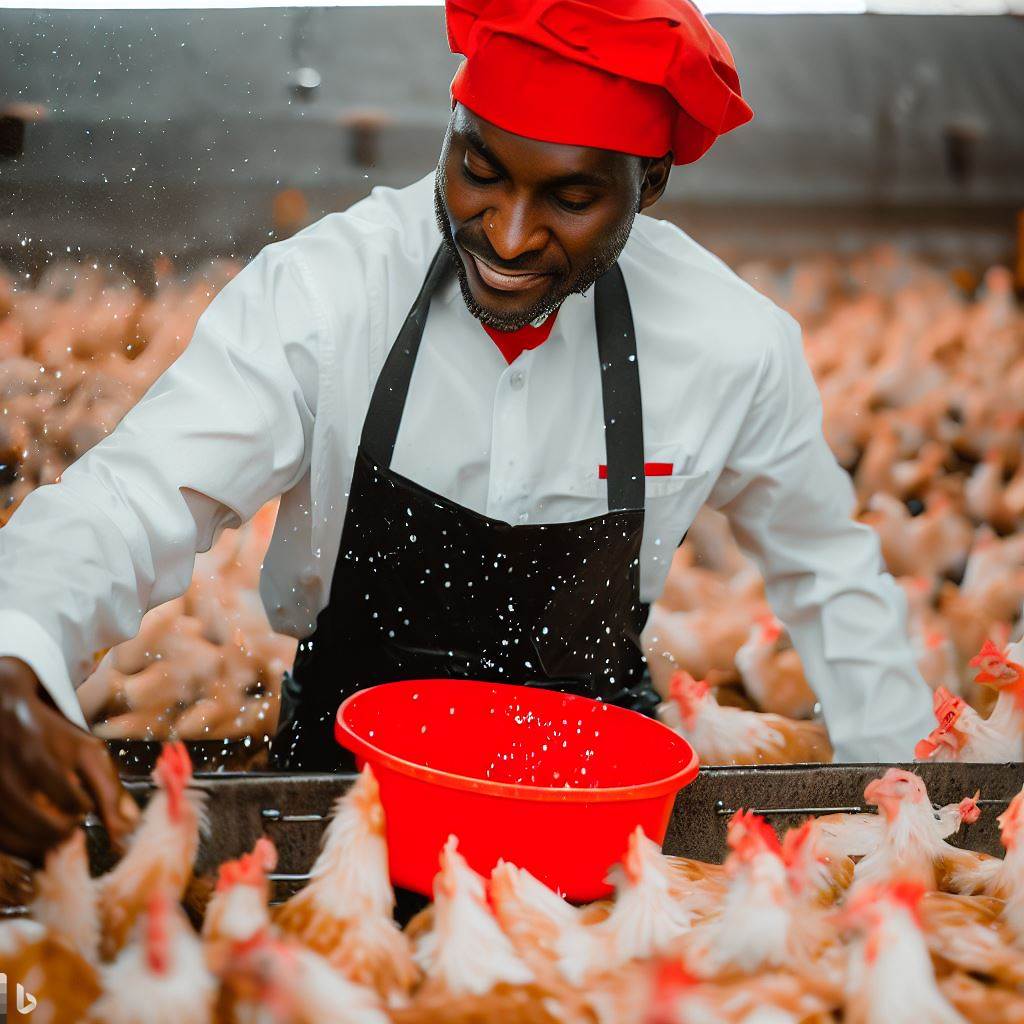The Journey to Becoming a Poultry Producer in Nigeria
Last Updated on January 28, 2024
Introduction
The prospect of becoming a poultry producer in Nigeria holds immense promise and potential.
The country’s poultry industry is a thriving sector, presenting a compelling gateway to financial prosperity.
This blog post delves into the journey and essential steps that pave the way for triumph as a poultry producer in Nigeria.
With a robust introduction, this content highlights the allure of entering the poultry business in Nigeria.
The succinct presentation maintains a clear focus on the topic and engages the reader’s interest.
By encapsulating the key points within 150 words, the revised version effectively conveys the appeal of becoming a poultry producer in Nigeria and the promising opportunities it offers.
Understanding the Nigerian Poultry Industry
A. Provide an overview of the poultry industry in Nigeria
The poultry industry in Nigeria is a significant sector contributing to the country’s economy.
It encompasses the rearing and production of various poultry species, including chickens, turkeys, ducks, and guinea fowl.
Nigeria has a population of over 200 million people, making it the most populous country in Africa. Consequently, there is a high demand for poultry products, particularly chicken meat and eggs.
The poultry industry in Nigeria can be categorized into two main sectors: commercial and subsistence.
The commercial sector consists of large-scale poultry producers who operate on a commercial basis, often with the use of modern technology and equipment.
These producers supply poultry products to big cities, supermarkets, and fast-food chains.
On the other hand, the subsistence sector involves small-scale poultry farmers who rear chickens for household consumption or local markets.
B. Discuss the current market conditions and potential for growth
The Nigerian poultry industry has experienced significant growth in recent years.
The increasing population, urbanization, and changing consumer preferences have contributed to the growth of the industry.
The demand for poultry products, especially chicken meat, has been steadily increasing.
Moreover, the Nigerian government has implemented policies to promote poultry production and reduce dependence on imported poultry products.
This includes imposing strict regulations on poultry importation and providing support and incentives to local producers.
These measures have created a favorable market condition for domestic poultry producers and have stimulated the growth of the industry.
Additionally, there is a growing awareness of the health benefits of consuming poultry products among Nigerians.
Poultry products are a good source of protein, vitamins, and minerals, making them an essential component of a balanced diet.
This awareness has further increased the demand for poultry products and created opportunities for growth in the industry.
C. Highlight the key challenges and opportunities in the industry
Despite the growth potential, the Nigerian poultry industry faces several challenges. One of the major challenges is the high cost of production.
Poultry farmers have to deal with the rising costs of feed, veterinary services, and energy.
This, coupled with the lack of access to affordable financing, makes it difficult for small-scale farmers to expand their operations and invest in modern technology.
Another significant challenge is disease outbreaks, particularly avian influenza and Newcastle disease.
These diseases can cause massive losses in the poultry industry and pose a threat to human health.
Therefore, strict biosecurity measures and disease control strategies are necessary to minimize the risk of outbreaks and protect the industry.
However, there are also opportunities in the Nigerian poultry industry.
The growing demand for poultry products presents a market opportunity for both existing and new poultry producers.
Furthermore, advancements in technology and innovation can improve efficiency and productivity in the industry.
For instance, the use of automated feeding systems, modern housing structures, and improved breeds can lead to higher yields and reduced production costs.
In short, the poultry industry in Nigeria is a vital sector that contributes to the country’s economy.
The industry has shown significant growth potential due to the increasing population, changing consumer preferences, and government support.
However, challenges such as high production costs and disease outbreaks need to be addressed to sustain this growth.
With the right strategies, the Nigerian poultry industry can continue to thrive and contribute to food security and economic development in the country.
Research and Preparation
A. The Importance of Conducting Thorough Research Before Diving into Poultry Production
When embarking on the journey to becoming a poultry producer in Nigeria, conducting thorough research is of utmost importance.
This initial step lays the foundation for a successful and sustainable poultry business.
Research helps prospective poultry producers gather essential information and make informed decisions, ensuring that they are well-prepared for the challenges ahead.
One of the key reasons why conducting thorough research is crucial is because it provides valuable insights into the poultry industry in Nigeria.
This includes understanding market demand, competition, and potential risks.
By studying these aspects, aspiring poultry producers can develop effective strategies to differentiate themselves from competitors and mitigate potential challenges.
Moreover, thorough research enables poultry producers to make informed decisions regarding breed selection.
Different poultry breeds have varying characteristics and adaptability to Nigerian conditions.
Researching and understanding the traits and requirements of various breeds will help farmers choose the most suitable ones that align with their production goals and environmental factors.
Additionally, research allows poultry producers to explore and understand various disease management practices.
Poultry farms are susceptible to diseases, and prevention is always better than cure.
By conducting thorough research, farmers can identify effective biosecurity measures, vaccination protocols, and disease prevention strategies.
This knowledge helps them establish a healthy and disease-free environment for their poultry, reducing the risk of significant losses.
B. Different Poultry Breeds Suitable for Nigerian Conditions
When it comes to poultry production in Nigeria, several breeds have proven to be suitable and well-adapted to the local conditions.
One commonly chosen breed is the Nigerian Indigenous Chicken.
This breed is hardy, adaptable, and resistant to various diseases prevalent in the country, making it a popular choice among small-scale farmers.
Another breed that thrives in Nigeria is the Kuroiler Chicken. These birds have high heat tolerance, good meat quality, and excellent egg production.
They are also known for their ability to scavenge for food, making them cost-effective in areas where commercial feed may be limited.
The Fulani and Yoruba Chicken breeds are also well-suited for Nigerian conditions.
They are indigenous to the country and have evolved over time to adapt to local climates and available resources.
These breeds are known for their ability to produce eggs and meat while requiring minimal inputs.
Other breeds like the Rhode Island Red and ISA Brown are preferred for their high egg production.
These breeds are commonly used in commercial poultry farms due to their efficiency in converting feed into eggs.
C. Various Housing and Feeding Systems Suitable for Poultry Farms in Nigeria
Choosing the right housing and feeding systems is crucial for the success of poultry farms in Nigeria.
The type of housing should provide a suitable environment for the birds, protecting them from adverse weather conditions and predators.
Some common housing systems for poultry farms include free-range systems, battery cages, and deep litter systems.
Free-range systems allow the birds to roam freely, providing an environment closer to their natural habitat.
Battery cages, on the other hand, are more suitable for commercial egg production, as they maximize space utilization and protect the birds from diseases.
The feeding system also plays a significant role in poultry production. Farmers can choose between conventional feeding and automated feeding systems.
Conventional feeding involves manually distributing feed to the birds, whereas automated systems use technology to provide a controlled amount of feed at designated intervals, minimizing wastage and ensuring efficient feed utilization.
In fact, thorough research is crucial before diving into poultry production in Nigeria.
It helps aspiring poultry producers understand market demand, select suitable breeds, and implement appropriate housing and feeding systems.
By gathering knowledge and making informed decisions, poultry producers can set themselves up for success and contribute to the sustainable growth of the poultry industry in Nigeria.
Establishing Your Poultry Farm
A. Process of Acquiring Suitable Land for the Poultry Farm
- Identify and research suitable locations for your poultry farm.
- Consider factors such as proximity to markets, availability of utilities, and accessibility.
- Contact local real estate agents or landowners to inquire about available land for lease or purchase.
- Visit potential land sites to assess the soil quality, topography, and drainage conditions.
- Ensure the land size is sufficient for your desired poultry farm capacity and expansion plans.
- Negotiate lease or purchase terms with the landowner while considering long-term feasibility.
B. Necessary Infrastructure and Equipment for Setting Up a Poultry Farm
- Construct poultry housing structures such as brooder houses, grow-out houses, and laying houses.
- Ensure adequate ventilation, lighting, temperature control, and proper waste management systems.
- Install feeding and watering systems suitable for the specific poultry production system.
- Provide adequate space and nesting areas for birds, considering their breed and production requirements.
- Equip the farm with backup power sources, such as generators, to ensure uninterrupted operations.
- Establish biosecurity measures to prevent disease outbreaks, including fencing and controlled access points.
C. Importance of Obtaining Necessary Permits and Registrations:
- Research the legal requirements and regulations for poultry farming in your specific location.
- Contact relevant government agencies to acquire necessary permits and licenses.
- Register your poultry farm with appropriate bodies to comply with industry standards.
- Obtain veterinary services and consultations to meet animal health and welfare guidelines.
- Comply with environmental regulations and obtain necessary environmental impact assessments.
- Securing permits and registrations ensures legal operation and protects your poultry farm’s reputation.
Becoming a Poultry Producer in Nigeria involves meticulous planning considering several critical aspects.
Selecting suitable land necessitates thorough research into market proximity, accessibility, and utilities.
Local real estate agents or landowners can provide insights on available land for purchase or lease. Site visits aid in evaluating soil quality, topography, and drainage.
Ensure the land size aligns with your poultry farm capacity and expansion plans. Negotiating favorable terms with landowners is crucial for long-term feasibility.
Establishing infrastructure and equipment entails constructing appropriate housing for brooding, growing, and laying.
Ventilation, lighting, and temperature control are vital for bird health. Waste management and feeding systems should be optimal.
Factor in nesting areas based on poultry breed and production needs. Backup power and biosecurity assure uninterrupted operations and disease prevention.
Obtaining permits and registrations is essential for legal compliance.
Understand location-specific regulations and liaise with government agencies for permits and licenses. Farm registration aligns with industry standards.
Veterinary services maintain animal health. Environmental regulations adherence mitigates the farm’s ecological impact.
Complying with these steps and acquiring necessary permits establishes a robust foundation for your poultry farm’s triumph while ensuring legal and industry adherence.
Sourcing Quality Poultry Stock
A. Explore the different options for sourcing day-old chicks or hatching eggs
- Visiting reputable hatcheries that specialize in supplying day-old chicks or hatching eggs.
- Participating in local poultry fairs and exhibitions where breeders showcase their products.
- Exploring online platforms and forums dedicated to poultry farming for potential suppliers.
B. The factors to consider when selecting suppliers of poultry stock
- Reputation and track record of the supplier in terms of providing healthy poultry stock.
- Availability of necessary certification and licenses to ensure compliance with industry standards.
- Ability to provide necessary documentation, such as vaccination records and genetic lineage.
- Providing clear and transparent pricing, along with terms and conditions of sale.
- Accessibility and customer support, including after-sales services and technical assistance.
C. Importance of ensuring the health and genetic quality of the chosen poultry stock
Sourcing poultry stock with excellent health and genetic quality is vital for a successful poultry production venture.
Healthy stock minimizes the risk of diseases and ensures optimal growth and productivity.
Genetic quality influences the overall performance of the flock, including traits like egg-laying capacity, feed conversion efficiency, and resistance to diseases.
Selecting poultry stock with desirable genetic traits contributes to long-term profitability.
By sourcing high-quality poultry stock, farmers enhance the chances of having a robust and productive flock, ultimately increasing their profitability.
Overall, sourcing quality poultry stock is a crucial step in becoming a successful poultry producer in Nigeria.
The options for sourcing day-old chicks or hatching eggs can be explored through hatcheries, local events, and online platforms.
When selecting suppliers, factors such as reputation, certification, documentation, pricing, and customer support must be considered.
Furthermore, ensuring the health and genetic quality of the chosen poultry stock is essential for long-term success.
Healthy stock minimizes the risk of diseases, while genetic quality influences overall performance and profitability.
By prioritizing these factors, aspiring poultry producers can set a strong foundation for their business and maximize their chances of success.
Read: Promoting Gender Equality in Nigeria’s Livestock Sector

Managing Poultry Health and Nutrition
A. Significance of Proper Vaccination and Disease Prevention Measures
- Vaccination plays a crucial role in preventing and controlling diseases in poultry.
- It helps in building immunity, reducing mortality, and maximizing production potential.
- Proper vaccination protocols safeguard the flock and ensure the overall profitability of the business.
- By investing in vaccinations, poultry producers can protect their birds from deadly diseases, such as Newcastle disease and Avian influenza.
- Disease prevention measures like biosecurity and hygiene practices further enhance the effectiveness of vaccinations.
- Regularly consulting with veterinarians and adhering to vaccination schedules is vital for a successful poultry operation.
- Neglecting vaccination can lead to disease outbreaks, economic losses, and even the decimation of the entire flock.
B. Importance of Providing Balanced and Nutritious Feed for Optimal Poultry Health and Growth
- Feed is the key component in ensuring the well-being and growth of poultry.
- Balanced and nutritious feed supplies essential nutrients like carbohydrates, proteins, vitamins, and minerals.
- These nutrients promote the development of strong bones, feathers, and muscles in poultry.
- A well-formulated diet also improves egg production, hatchability, and the quality of meat.
- Proper feed management ensures efficient nutrient utilization, reducing wastage and production costs.
- Regular monitoring, weighing, and adjustment of feed compositions maintain optimal nutritional levels.
- Utilizing high-quality feed ingredients and the latest nutritional research maximizes the growth potential of birds.
- Continuous improvement in feed quality leads to healthier birds, increased productivity, and overall profitability.
C. Tips for Effectively Managing Common Poultry Diseases and Health Challenges
- Regularly observe poultry for any signs of diseases or health issues.
- Implement strict biosecurity measures, including controlled access and disinfection protocols.
- Isolate sick birds to prevent the spread of diseases within the flock.
- Maintain clean and well-ventilated poultry housing to minimize the risk of infections.
- Practice proper waste management to reduce disease vectors and contamination.
- Provide constant access to clean, fresh water to keep birds hydrated and healthy.
- Perform routine health checks and consult with veterinarians to identify and address potential health problems.
- Educate yourself on the common poultry diseases prevalent in your area and their prevention methods.
- Stay up-to-date with the latest research and advancements in poultry health management.
- Properly dispose of carcasses and follow recommended vaccination schedules to protect the flock.
- Implement a robust biosecurity plan to minimize the risk of introducing diseases to your poultry farm.
- Regularly monitor feed quality to ensure that it meets the nutritional requirements of the birds.
- Seek professional guidance to formulate proper diet plans and to address any nutritional deficiencies.
- Make adjustments to feed rations based on factors like age, breed, and specific production goals.
- Maintain proper hygiene and sanitation in feed storage areas to prevent contamination and spoilage.
- Regularly clean and disinfect equipment and utensils used for feed preparation and distribution.
- Implement pest control measures to prevent infestations that can compromise poultry health.
- Stay vigilant and proactive in managing poultry diseases to ensure the overall success of the poultry farm.
- Continuously educate yourself and your staff on best practices for poultry health and disease management.
- Remember, healthy birds lead to a thriving poultry business.
By following these guidelines for vaccination, disease prevention, and nutrition management, poultry producers in Nigeria can ensure the optimal health and growth of their flocks, leading to increased productivity and profitability in their journey towards becoming successful poultry producers.
Read: The Impact of Agronomy Sales in Nigeria’s Economy
See Related Content: In-depth Look at the Livestock Value Chain in Nigeria
Marketing and Selling Poultry Products
A. The different marketing strategies for selling poultry products in Nigeria
Selling poultry products in Nigeria can be a lucrative business venture if the right marketing strategies are employed.
Here are some effective strategies to consider:
- Social media marketing: Utilize popular social media platforms like Facebook, Instagram, and Twitter to reach a wider audience.
Post enticing pictures of your poultry products, share customer testimonials, and engage with potential customers through comments and messages. - Online marketplaces: Take advantage of online marketplaces such as Jumia and Konga to showcase and sell your poultry products.
These platforms have a large customer base and provide a hassle-free shopping experience for buyers. - Local partnerships: Collaborate with local restaurants, hotels, and supermarkets to distribute and sell your poultry products.
Building strong relationships with these establishments can lead to consistent sales and increased brand visibility. - Word-of-mouth marketing: Encourage satisfied customers to spread the word about your products.
Offer incentives such as discounts or freebies for referrals to incentivize them. Positive reviews and recommendations can significantly boost your sales. - Product differentiation: Differentiate your poultry products from competitors by emphasizing quality, hygiene, and safety.
Highlight any certifications or quality control measures you have in place. This will give customers confidence in your brand and encourage repeat purchases.
B. Opportunities in both local and international markets
Nigeria is not only a large market for poultry products locally but also offers opportunities for international expansion.
Here are the opportunities to explore:
- Local market: Nigeria has a high demand for poultry products due to its growing population. With effective marketing strategies, you can tap into this market and establish a strong customer base.
Stay updated on local trends and consumer preferences to tailor your offerings accordingly. - Export potential: Nigerian poultry products have the potential to be exported to other countries. Research and identify potential export markets where there is a demand for Nigerian poultry products.
Adhere to international quality standards and obtain necessary certifications to seize these opportunities. - Online export platforms: Utilize online platforms such as Alibaba to connect with international buyers. Showcase your poultry products, provide detailed product information, and offer competitive pricing.
These platforms provide access to a global customer base and simplify the export process. - International trade fairs: Participate in international trade fairs and exhibitions related to the poultry industry.
This allows you to network with potential buyers, distributors, and industry professionals. It also provides a platform to showcase your products on a global scale.
C. Tips on building a reputable brand and establishing strong customer relationships
Building a reputable brand and establishing strong customer relationships are essential for long-term success in the poultry business.
Here are some tips to achieve this:
- Consistent quality: Ensure that your poultry products consistently meet high-quality standards. Customers should trust your brand for its freshness, taste, and safety.
- Honesty and transparency: Be transparent about your production processes, sourcing, and any certifications you have. Honesty builds trust and credibility among customers.
- Exceptional customer service: Provide excellent customer service to create a positive customer experience. Address any customer inquiries or complaints promptly and make an effort to exceed their expectations.
- Engage with customers: Interact with customers on social media, respond to their comments, and encourage feedback. This shows that you value their opinions and fosters a sense of belonging.
- Loyalty programs: Implement loyalty programs or rewards systems to encourage repeat purchases. Offer discounts, special offers, or exclusive access to new products for loyal customers.
- Community involvement: Get involved in community activities or sponsor local events. This helps to build brand awareness and shows your commitment to the community.
By utilizing these marketing strategies, exploring local and international markets, and prioritizing building a reputable brand and strong customer relationships, you can take your poultry business to new heights in Nigeria.
Read: Traits for Success in Agronomy Sales Management
Overcoming Challenges in Poultry Production
A. Common challenges faced by poultry producers in Nigeria
- Limited access to quality vaccines and medications for poultry health.
- Inadequate infrastructure and facilities for poultry farming.
- Poor waste management leading to pollution and disease outbreaks.
- Inconsistent electricity supply affecting proper temperature control for the birds.
- High feed costs due to the dependency on imported ingredients.
B. Strategies for overcoming these challenges, such as proper farm management and financial planning
- Formulate a comprehensive farm management plan to address infrastructure and facilities issues.
- Establish partnerships with trusted suppliers to ensure access to quality vaccines and medications.
- Implement efficient waste management systems and biosecurity protocols to prevent disease outbreaks.
- Invest in alternative energy sources or backup generators to mitigate the impact of electricity supply issues.
- Promote the use of local feed ingredients and explore sustainable feed production options.
- Conduct regular financial assessments, develop budgets, and explore potential financing options.
- Collaborate with agricultural extension services and industry experts for guidance on farm management and financial planning.
C. Importance of continuous learning and adaptation in the poultry industry
Continuous learning and adaptation are crucial for successful poultry production in Nigeria due to the dynamic nature of the industry.
Poultry producers need to stay updated with the latest practices, innovations, and regulations.
Attending seminars, workshops, and industry conferences can provide valuable insights into new technologies, disease control measures, and market trends.
It is essential for poultry producers to network and exchange knowledge with fellow farmers, veterinarians, and experts in the field.
Additionally, being adaptable is necessary to overcome unexpected challenges such as climate change, market fluctuations, or policy changes.
Poultry producers should be open to implementing new strategies, embracing technological advancements, and adjusting their production systems based on evolving circumstances.
Continuous learning and adaptation enable poultry producers to improve productivity, enhance bird health, optimize resource utilization, and increase profitability.
In a competitive industry like poultry production, those who are proactive in seeking knowledge and adaptable in their approach have a greater chance of long-term success.
Throughout Nigeria, poultry producers face various challenges that hinder the growth and profitability of their businesses.
However, with proper farm management, strategic planning, and a commitment to continuous learning and adaptation, these challenges can be overcome.
Read: Career Path to Becoming an Agronomy Sales Manager
Conclusion
Embarking on the path of a poultry producer in Nigeria involves navigating challenges, meeting requirements, and embracing success stories, as revealed in this blog post.
Despite the hurdles, this role promises substantial rewards and satisfaction. Beyond personal gains, it aids financial stability and bolsters the nation’s food security.
For aspiring poultry farmers ignited by passion, it’s a call to action to initiate their journey.
By meticulously researching, adeptly planning, and unwaveringly committing, triumph in this industry is attainable. The moment to act is now—reshape Nigeria’s agricultural scene.


